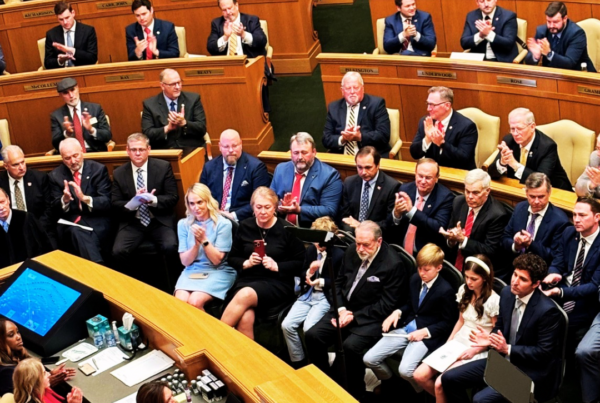TL;DR:
- Legislators have reviewed budget proposals ahead of fiscal session
- Pre-budget sessions are typically perfunctory; the legislature tends to defer to the executive branch’s suggestions
- Day 1: discussions on higher education and prison issues
- Day 2: discussions on Department of Human Services and LEARNS
- Day 3: discussions on Department of Public Safety and Department of Health matters
- Some members raised concerns over funding for LEARNS provisions and prison overcrowding
- There’s a bit of a mixed outlook on higher education funding and workforce training
Fiscal session 2024 is right around the corner, Lord help us all. Last week, the legislature had three days of pre-session budget meetings. These meetings are a chance for the legislature to hear from the executive branch about what it thinks the budgetary priorities for the next year should be. Strangely, Governor Sanders did not present the overall budget herself.
We attended these meetings and live-tweeted each one. You can find the unrolled threads below:
Day 1: https://threadreaderapp.com/thread/1765387815708152148.html
Day 2: https://threadreaderapp.com/thread/1765749387215413684.html
Day 3: https://threadreaderapp.com/thread/1766113038829011209.html
Now that the meetings are over, we want to indulge in a little shameless prediction and see what we can glean about the legislature’s intentions in the upcoming session. We’ll dive into the more interesting moments in each day and read between the lines. This will be a longer post, but we think it’s important Arkansans know how the legislature puts our tax dollars to work.
Primer on the Meetings and Fiscal Sessions
The meetings do not set the actual budgets that will be agreed upon during the Fiscal Session. Each department or division submits an “executive recommendation” for their budget and creates a report justifying that appropriations request.
The point of these meetings is to give legislators a high-level overview of each department and let them ask questions about specific line items in the upcoming appropriations. Once the legislators are satisfied, they approve the executive recommendations. If they’re not satisfied, they can reduce or increase the appropriations for departments. The numbers then go to the hardworking Fiscal Service Division of the Bureau of Legislative Research, which will put the numbers into legislative language for members to vote on.
In general, fiscal sessions tend to be fairly perfunctory. These are huge departments with thousands of employees and sometimes billion dollar plus budgets. The legislators are not economic or organizational experts, so in large part they defer to the executive recommendations. They like to get in, do the work, and go home; it’s the rare time we all appreciate them.
The session is legally precluded from being longer than 30 days; with a 3/4ths vote, legislators can make one 15-day extension. With a 2/3rds vote in both chambers, they’re permitted to take up business outside budgetary concerns, but there’s historically been a reluctance to do so. The feeling among legislators is that if they do it once, a dam will break and something outside budgetary concerns will come up every fiscal session.
This would essentially turn the fiscal session into another general session, and they don’t want that. For example, even here in Arkansas, Bob Ballinger couldn’t get the Senate to take up anti-abortion legislation in 2022.
So, let’s dive into these meetings and what they might signal for fiscal session priorities.
Day 1: Higher Ed and Prisons
The big topics for Day 1: higher education “productivity” models and prison space.
- We anticipate more state police training academies. This comes as Arkansas State Police (ASP) faces criticism based on their shilling for Governor Sanders’ FOIA changes and their overuse of deadly PIT maneuvers.
- The higher ed productivity model death loop is hurting every university that’s not U of A Fayetteville. The model is defined by the number of degrees or certifications produced, student retention, affordability, and a growing student body. There’s just one problem, however. Schools that are less productive get less money, meaning they can’t fix the problems that led to lower productivity in the first place. Universities like UALR or UCA— which are important for location and affordability reasons, especially for non-traditional students—end up losing money to universities like U of A Fayetteville, which is fairly well-funded already.
- In great news, Henderson State and UAMS are both crawling out of financial difficulties. UAMS is in the black after a rough financial report last year, and they’re confident they will maintain a balanced budget. They’re still asking for an additional $60 million to increase staffing capacities and reach full capacity. Henderson State still has a way to go to fix its problems, but the legislators seemed grateful for the hard work of the current administration.
- The big theme for prisons: bed space and the beef between the prison board and the executive branch. It’s a well-known fact that the state is out of prison beds, leading to overcrowding and understaffing across Arkansas. The situation is so dire that the Department of Corrections has discussed moving some prisoners to out-of-state beds, something that caused concern from both parties. These are only discussions, and supposedly the cost would be roughly equal to the current solution, which uses county jails to house overflow inmates.
- Things started to heat up when we got to the new prison facility. The legislature is deeply frustrated with the speed— lack of speed, to be specific—of construction. They’re still sitting on a lot of the money allocated for the construction. Although there was no explicit mention of intervention, and it’s unclear how they even could intervene, the frustrations were evident.
Summary: Prisons will certainly be a major topic of discussion during the fiscal session. We can’t say what that discussion will entail, but we’ve talked before about the legislature feeling frustrated and cut out of actual governing under Governor Sanders; even her allies are annoyed with her penchant for bulldozing. It wouldn’t surprise us if they found a way to use the power of the purse to force a resolution.
Some of the Democrats seemed frustrated by the current funding model for higher education. However, it doesn’t seem like there’s much to be done. Overall, though, the legislature seems pleased by UAMS’ and Henderson’s progress. Sen. Tucker may try to play around with scholarship funding to better support students through inflation, which would be great!
Day 2: DHS and LEARNS
LEARNS dominated Day 2, but there were a few other interesting tidbits—namely, how much the radical right wants to cut programs supporting refugees and unhoused folks.
- For being such a massive department, the Arkansas Department of Human Services (DHS) was relatively perfunctory. The DHS budget is one of the largest in the state government, but they have their fingers in so many pies it’s almost impossible to follow. Legislators mostly focused on the high turnover rates for the department and funding for programs that support unhoused folks and refugees.
- DHS has implemented several programs to deal with the high turnover, which seem to be working. We hope these programs spread throughout the government; the data are unequivocal that better maternal/paternal leave, flexible work schedules, and hybrid working environments are good for employees.
- Several legislators asked pointed questions about programs that resettle refugees and serve unhoused folks. This was concerning. First, the refugee resettlement program served only 169 people last year. Second, it’s been proven to be effective; most individuals go to work immediately and lose access to the direct cash payments the legislators asked about. We’re worried the legislature will ride the tide of anti-immigration sentiment in the country and come for this program. They’ve already shown hostility toward unhoused folks in the past.
- Rep. Lundstrum continues her hostility toward poor folks. She seems like she’s looking to cut TANF (Temporary Assistance for Needy Families) despite the fact that the state’s unacceptable maternal mortality rate hasn’t left the news since the beginning of the year. We’ll watch this closely, particularly after there was some talk of messing with WIC (Women, Infants, and Children) funding on Day 3.
- The big one, of course, was LEARNS. Sec. Oliva graced the room with his presence. It’s hard to tell from our live tweets, but we can’t overstate how frustrating he is. He demurs, deflects, and distracts instead of answering essential questions. Fortunately, Rep. Wooten was there to call him out. The issues with LEARNS are numerous and well-documented, but we want to focus on two big issues: educational co-ops and teacher pay.
- Educational co-ops that underperform are getting cut as “bad investments.” This is horrific. The state is highly rural, and the importance of co-ops to rural communities can’t be overstated. Sen. Leding stated that at least sixty jobs across the state are being cut to pay for the literacy specialists. Literacy is important, but that doesn’t mean much if there aren’t any teachers to teach, you know, everything else. This is another one we’re watching closely.
- Reps. Wooten, Duke, and Sen. Chesterfield pressed the Secretary hard on teacher raises. The raises, on their own, are unequivocally good. The issue is that the Department of Education doesn’t seem to have a plan to sustain funding for those raises into year 2 of LEARNS.
- Districts that are trying to save money by implementing split classrooms feel penalized by the raises because they’re already underfunded and have received no support from the state to get these raises done. In response, Sec. Oliva said there might have to be “winners and losers.” This kind of thinking shows just how little the Secretary actually cares about education. Kids will suffer because he rammed through bad legislation. Education isn’t a competition.
- Rep. Wooten explicitly called this an “unfair system,” and he’s right. It’s so bad they don’t even have an estimate on how much private school vouchers will cost. Your tax dollars at work, Arkansas.
- Rep. Collins brought up the flat funding rate for workforce/vocational training.This is where things started to go a little better. The relevant subdivision has a plan in place to target high wage/high demand jobs, acquire equipment for training, and get students interested in the targeted trades. This is great news! These jobs will be very important.
Summary: LEARNS continues to be an utter disaster. The Secretary either couldn’t or refused to answer basic questions about how the law will be funded.Even Sen. Davis didn’t show her face to try to defend him. The loss of educational co-ops will be devastating for rural communities, and small districts across the state are receiving little to no support to fund the required $50k raises.
DHS seems to be in a good place, but there was an undercurrent of hostility toward programs that support needy families. Rep. Lundstrum is well-known for her attitude toward poor folks, so we wouldn’t be surprised to see cuts to these programs. Again, we are in the middle of a massive maternal mortality crisis, so this is the perfect time to cut assistive programs, apparently. It’s immensely frustrating, to say the least.
Day 3: DPS and DoH
Thankfully, Day 3 was pretty short. The legislators spent a lot of time discussing the new crime lab but were pretty easily convinced by the experts that it was essential to the state. Crime rates will almost certainly come up as a political cudgel against Democrats, but that’s to be expected.
- The backlog of sexual assault test kits has been a longstanding stain on the state. The Department of Public Safety (DPS) has finally added enough DNA analysts to get the turnaround time to 90 days. They are confident they’ll get it down to 60 days by next year (still not fast enough, but it’s better than the current 8 month wait).
- The head of the crime lab also anticipates the crime lab will help reduce the crime rate. One thing that definitely needs to change: the abysmal salaries for forensic pathologists. We want to give a shout out to Sen. Flowers here; she had a moving statement on the causes of crime and her personal history.We encourage you to read her statement here, because any summary wouldn’t do it justice.
- There was some discussion about the maternal mortality rate again today (not enough, in our opinion). It looks like funding will be redistributed to help fund education campaigns aimed toward expectant mothers. More concerningly, there was a question about the number of reports from pharmacists who prescribed oral contraception. It’s worrisome in the midst of the current crisis; smooth access to contraception is a proven way to reduce maternal mortality rates.
- The appropriation level for WIC (women, infants, and children) was reduced a bit. Understandably, a few folks on social media were concerned about this. WIC is an incredible program that supports a ton of folks around the state. To be clear, this is not a cut. The program received more money than it spent last year, so legislators wanted to equalize those amounts. They can always reappropriate money later if necessary. That being said, it’s still a really bad look; this is another thing we’ll be watching closely.
Summary: Day 3 was relatively straightforward. The legislators had a lot of questions, but there was nothing like the LEARNS dustup from Day 2. The new state crime lab seems as though it will be a huge boon to increasing the effectiveness of law enforcement. The Department of Health has a few plans in place already to reduce the maternal mortality rate, but the legislators will need to watch carefully and be sure the Governor follows through.





